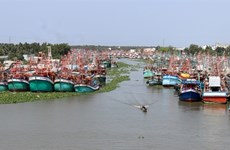Collective economy needs more momentum: official
Politburo member Le Hong Anh has highlighted the need to roll out incentives for collective economic organisations and cooperatives to consolidate their operations.
 Politburo member Le Hong Anh (white shirt) (Source: VNA)
Politburo member Le Hong Anh (white shirt) (Source: VNA)Anh was speaking at a conference to review the three-year implementation of the Political Bureau’s Conclusion No. 56-KL/TW on accelerating the actualisation of the Resolution of the ninth Party Central Committee’s fifth plenum on the collective economy in Hanoi on September 22.
He urged improved State management capacity over the collective economy, thus creating consensus from central to grassroots levels.
The Vietnam Cooperative Alliance was asked to well execute its role as a representative body of cooperatives while fulfilling tasks stipulated in the 2012 Cooperative Law.
Apart from joining hands with research institutes and schools in personnel training, the alliance should take the initiative to boost international affiliations to promote the economic model, said the Politburo member.
He called on the Vietnam Fatherland Front (VFF); associations of farmers, women, youths and war veterans; and other organisations to take a more active role in collective economic development.
Cooperatives need to renovate themselves, improve their management capacity and revamp their operations, thus turning the collective economy into an important economic sector, he noted.
At the meeting, President of the VFF Central Committee Nguyen Thien Nhan delivered a speech on new-style agricultural cooperative development, which he considered a breakthrough in restructuring agriculture and raising farmers’ sustainable income.
While pointing to lingering bottlenecks hindering the country’s agricultural development, Nhan emphasised the need for the Fatherland Front, its member organisations and all-level authorities to coordinate with each other in establishing cooperatives in communes and districts.
Event participants agreed on missions and solutions to continue fostering the development of the collective economy and cooperatives moving forward.
A report presented at the meeting showed that after the three-year implementation of Conclusion No. 56, the collective economic sector has seen positive changes.
By the end of 2014, the country had 143,000 cooperative groups with nearly 1.5 million members and nearly 19,000 cooperatives with a 7-million-strong staff.
The sector’s growth rate ranged from 3.3 to 3.5 percent last year, contributing some 5.15 percent to the nation’s GDP.
The agricultural restructuring process has given birth to new-style cooperatives that are connected with businesses and scientists to carry out modern farming methods, improve product competitiveness and create production chains in association with processing and consumption.
The collective economy, which covers various fields such as industry, agriculture, service, transport and banking, has contributed markedly to the country’s socio-economic development, the report said.-VNA













